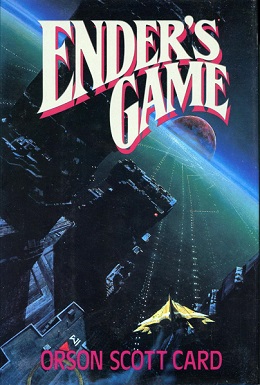Ender’s Game, by
Orson Scott Card, is a sci-fi novel set about a century into the future. The
main protagonist, Ender Wiggin, is what’s known as a Third; an extra, unwanted
child, illegal at the time due to population limitation laws.
Ender is young, brilliant, and needed. Humanity is at war
with another species, the Formics (typically referred to as ‘Buggers’), and
they’re desperate. They need strategists, and little Ender is full of promise.
He’s also six years old.
The novel details his journey through Battle
School
Overall, I found this novel to be quite engaging; Card
managed to create a likeable protagonist with whom I empathize easily. In
short, whatever Ender felt, I felt too. The characters were all well developed,
having depth and personality, often leaving you wondering what they’ll do next.
They really progress, growing and changing as the book advances. I really like
the fact that while there are clearly defined ‘good’ and ‘bad’ characters, Card
isn’t afraid to have characters that seem to fall somewhere in between.
The story was quite interesting as well, and with Card
there’s never a dull moment. He struck a fine balance between capturing the
life and emotions of the protagonist with the actions of the other characters.
Also put to fine use are the relationships between characters, such as that
between Ender and his two siblings, Peter and Valentine.
I found it quite interesting the way Card used video games
as a plot device, and having read the book and already being an avid gamer, I
wonder how many developers were inspired by it. While I’d honestly hate to give
out too much information as to just how they were used, there was one fantasy
game in particular, a world where Ender was free to roam about a world that was
constantly changing, decaying and growing. How Card came up with it, I may
never know. At the time the book was written, I honestly can’t think of a game
that fits its description regarding complexity. I know it doesn’t, and indeed
can’t for the sake of spoilers have much to do with this review, but it
certainly leaves me wondering about whether or not Card should actually try developing the game he described.
In all honesty, though, sometimes it felt like there were
blanks to fill in, areas in the book that just didn’t seem to be described in
any level of detail, simply unexplained rooms or undescribed people. In spite
of this, however, the book still shines.
Well, sure you wonder I was, don’t you my dear readers? Rest
assured I am safe and in relatively good health, however, my internet’s been
down for quite a while, thus getting online using my cell phone as a modem has
been… A challenge. I’ve been averaging about 4kb/s. Needless to say, some
things have been difficult, and accessing Blogger’s publishing tools? Forget
it. Accessing the mobile version of Facebook takes several minutes too long.
Anyhow, the next chapter of Paxcatia is coming, and very
soon at that, so stay tuned!


Surprise! Good review. I can't wait to read it =)
ReplyDelete